Blueberry farm is a perfect match for organic retailers
17th July 2025
Dorset Blueberry Company has a rich history, having introduced blueberries to the UK in the 1940s. Now, it exclusively supplies organic retailers, including Lush Cosmetics. Deputy editor Sarah Kidby spoke to David Trehane to find out more.
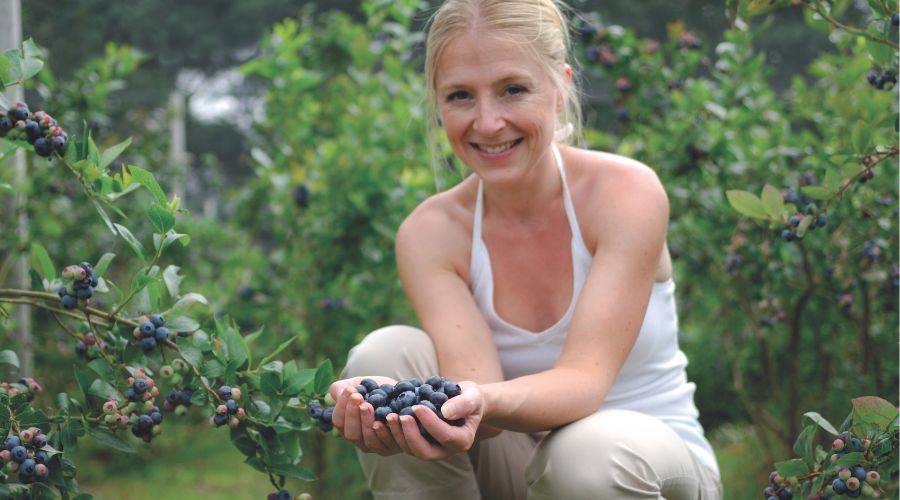
The UK’s first commercial blueberry producer is nestled in Dorset’s sandy heathlands, and its story dates all the way back to the 1940s.
David Trehane – grandfather of the farm’s current owner, who is also called David Trehane – saw an article in a farming magazine offering blueberry plants free to anyone in the UK who wanted them.
A parson on Lulu Island, British Columbia, was offering 100 plants; all the recipients had to do was pay for the carriage. David Trehane Snr was one of only four people to answer the advert, and although they arrived a little worse for wear from the journey, they thrived in his garden.
A few years later, his daughter, who was working for a fruit nursery in Hampshire at the time, received a telegram from her father, advising that 1,000 blueberry plants were arriving on RMS Queen Mary and could she help plant them. This was the very first commercial blueberry plantation in the UK and it is still productive today.
Current farm owner David told Fruit & Vine: “This was a time when people didn’t know what blueberries were and they were harvested with a rake up on the moors of Yorkshire, Somerset or Scotland, but these were larger, cultivated blueberries from America. That’s how it all started.”
This led to the first commercial blueberry plantation in the UK, and it remained the only one until the mid-90s.
Its acreage expanded over the course of the 60s and 70s with David’s uncle and grandfather, before David and his mother moved back down south and took over two-thirds of the original plantations. The hectarage quadrupled from the late 90s onwards, from around 2ha to 12ha today.
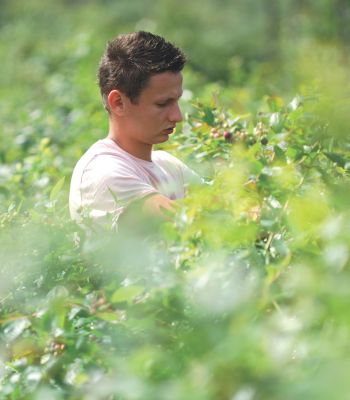
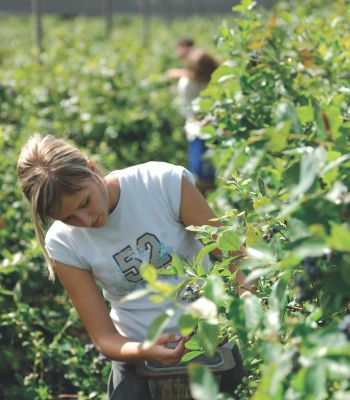
Traditional varieties
The old plantations are still fully productive and most of the varieties used by the organic farm are traditional, older varieties rather than the newer, crunchier alternatives now found on supermarket shelves.
Around seven varieties span the whole season, starting with Earliblue and Duke, following into Blueray and Berkeley, then Bluecrop, Ivanhoe and Coville. With all the varieties, flavour is the key attribute.
Despite previously supplying 100% of Marks & Spencer’s blueberries until around 2000, the fruit business no longer supplies supermarkets – opting instead for organic retailers Abel & Cole, Riverford, and Lush Cosmetics.
“The organic retailers are much more aligned to this sort of business,” explains David. “When everybody else started planting blueberries, it was obvious that the fruit was going to become a commodity, and indeed it has – they are now the second most popular soft fruit behind strawberries.
“We’re not interested in being a commodity and that is what supermarkets deal in. They deal in big volumes, low margins, and the infrastructure is just not suited to us, whereas the organic retailers are very much attuned to looking after their suppliers and looking after local produce – they are much more aligned to our own values.”
The farm has a long-standing relationship with Lush Cosmetics, for whom it currently supplies fruit for its popular Catastrophe Cosmetics facemasks. The retailer’s main UK manufacturing facility is in Poole, just 20 minutes away from Dorset Blueberry Company.
Interestingly, the fruit sent to Lush is not grade two or ‘waste’ fruit – it’s the same quality as the fruit supplied to the other two retailers for eating. This is largely down to the fact that the farm doesn’t have any grade two fruit, because of the way it’s grown and the large fruit size – which is a key factor in grade two, David comments.
Fruit is hand harvested and packed directly in the field before going straight into cold store, and it’s with retailers the next day.
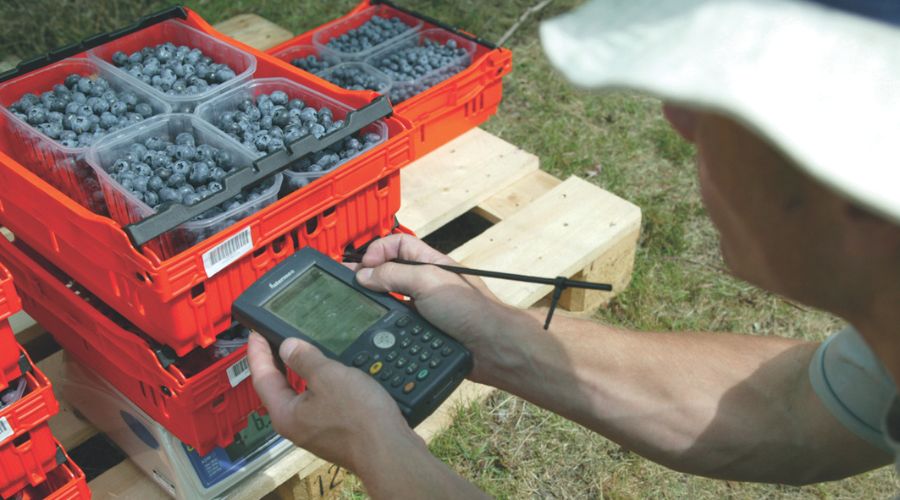
Difficult weather
As an organic farm, options for dealing with pests and disease are limited but fortunately, blueberries are a robust fruit, David explains.
Having said that, climatic conditions such as those seen over the past two years, with wet springs, creates a big problem with the fungal disease mummy berry, caused by Monilinia vaccinii-corymbosi.
“It can be pretty devastating and has had a significant impact on our yields for the last couple of years. You can’t get rid of it, particularly, but in terms of cultural practice, we have to be very mindful of how we rake out our prunings and cleaning the plantations, and we apply a natural fungicide made of an organism called Bacillus simplex.”
The farm’s blueberries are not grown under polytunnels, and with this fruit needing to be picked when it’s bone dry, unpredictable weather has also caused significant issues at harvest time.
“If we get a wet summer and we can’t get our harvest team in to pick it, the fruit rots on the bushes and that has a big impact again. We were pulling plastic sheeting over the rows when rain was forecast last year just to try and keep the rain off.”
Brexit impacts
Sourcing labour is a significant challenge as the farm is not large enough to make use of the Seasonal Agricultural Workers Scheme (SAWS), with the infrastructure it requires.
“Up until Brexit we had an absolutely fantastic system which worked well for us. We had people from the EU, mostly from the Czech Republic who came over – they were incredible people, lovely hardworking, professional students. They were highly educated, and they were brilliant. Brexit completely killed that,” David says.
Now the farm relies on local pickers or asylum seekers, but finding skilled and motivated pickers is a real challenge. “That inevitably puts the cost of harvest up, so that then has an impact on our bottom line.”
Sustainability
The farm’s plantations are right next door to a Site of Special Scientific Interest (SSSI) so they’re heavily involved with the ecology aspects of this, David adds.
Badgers from a nearby sett wander among the blueberry plantations, and sand lizards and adders are a regular sight, sunning themselves under the bushes. The farm also has 22 honeybee and bumblebee hives on site.
“The bees have had a hard time in recent years, so we’re doing absolutely everything we can to try and look after them,” David explains. Another part of the farm is in Countryside Stewardship Higher Tier and a wildflower meadow will be sown there.
The soil is sand over gravel and one of the downsides of this is limited soil life, so they use lots of woodchip, and, whenever possible incorporate mycorrhiza, organisms that bind themselves to the roots of the plants and encourage them to grow. Soil health testing is done every year.
After a very tough couple of years due to the weather, the farm’s priorities for the near future are consolidation and stabilisation, David concludes.
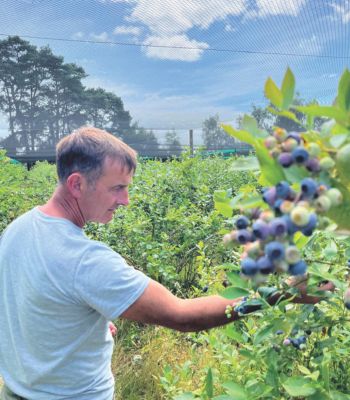
Grower Profile
Farm owner: David Trehane
Location: Wimborne, Dorset
Total size in ha: 12ha
Fruits grown: Blueberries (varieties: Earliblue, Duke, Blueray, Berkeley, Bluecrop, Ivanhoe and Coville)
Soil type: Sand over gravel
Sourcing local where possible
Lush buyer Morgan Brown said the local connection is an important part of their partnership with Dorset Blueberry Company, as is its organic status.
Lush uses seasonal British fruit wherever possible, particularly when it comes to fruit that grows naturally in the UK – but as a year-round business, some ingredients are sourced elsewhere in Europe and internationally.
The benefits of each food product for the skin are considered before deciding which products to create – in the case of Dorset’s blueberries, the fruit is packed with antioxidants, vitamins and minerals to rejuvenate the skin and encourage cell repair, Morgan explains.
The business also likes to respect cultures by sourcing fruits in their country of origin, and with manufacturing facilities around the world, products can then be made locally to the supplier. Examples of the retailer’s UK suppliers include The Garlic Farm Isle of Wight, Isle of Wight Tomatoes and Forest Fungi – as well as suppliers of summer berries, potatoes and carrots when these are in season.
Lush’s non-animal testing policy underpins its choice of supplier, with its products being 100% vegetarian and almost entirely vegan, except for those including honey and beeswax – and it looks at the ethos of potential suppliers as a whole.
However, Morgan says there are open communications and resources available for growers, and the business has an agroecologist to help advise suppliers on transitioning to organic practices.
Lush’s three-month freshness policy also eases this flexibility in switching from British suppliers to those elsewhere in the world – rather than bulk buying and manufacturing everything at once then selling it throughout the year, all the fresh and handmade products are out the door and sent to retailers within three months.
Find out more about Dorset Blueberry Farm.
Read more grower profiles.
